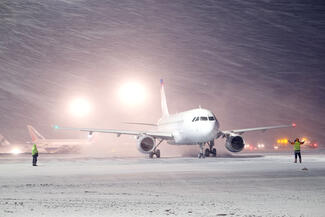A major snowstorm in the Midwest has led to significant air travel disruptions, with nearly 1,900 flights canceled nationwide. This weather-related turmoil is further compounded by the ongoing grounding of the Boeing 737 MAX 9 aircraft following an emergency incident on an Alaska Airlines flight.
Chicago's major airports, O'Hare International Airport (ORD) and Midway Airport (MDW), have been particularly affected. As of late morning Friday, O'Hare alone saw 650 cancellations. The Federal Aviation Administration (FAA) had to implement a ground stop at O'Hare, temporarily halting takeoffs and landings amid the storm. Even after operations resumed, the FAA estimated delays of at least two hours due to snow and ice.
Southwest Airlines, heavily impacted by the storm, canceled at least 385 flights, about 9% of its operation. The Dallas-based carrier has been working to bolster its winter weather ground equipment at its major Midway hub to avoid operational meltdowns like the one experienced in December 2022.
Regional carrier Skywest, operating flights for American, Delta, United, and Alaska Airlines, also faced nearly 330 flight cancellations by late morning Friday.
The weather-related disruptions are exacerbating the challenges faced by Alaska and United Airlines, both of which operate sizable fleets of 737 MAX 9 aircraft. These planes are currently grounded as Boeing, the airlines, and the FAA investigate the risk of similar incidents to the one that occurred on the Alaska flight last Friday.
United had to cancel around 10% of its flight schedule on Friday, slightly higher than the 7% to 9% of daily flights canceled earlier in the week. The weather in the Midwest, particularly at United's O'Hare hub, is making operations more challenging.
Travelers affected by weather-related disruptions have limited options. Airlines typically aren't responsible for additional costs incurred due to weather-related cancellations or delays. However, some airlines have issued travel waivers for more flexibility in changing itineraries without penalties. Under federal regulations, passengers are entitled to a refund if their flight is canceled or significantly delayed and they choose not to travel.
The situation is a reminder of the complexities
and challenges faced by airlines and passengers alike during severe weather conditions and technical issues. As the Midwest storm continues to affect air travel, and with the grounding of the 737 MAX 9 adding to the difficulties, travelers are advised to stay informed and check with their airlines for the latest updates on their flights.


